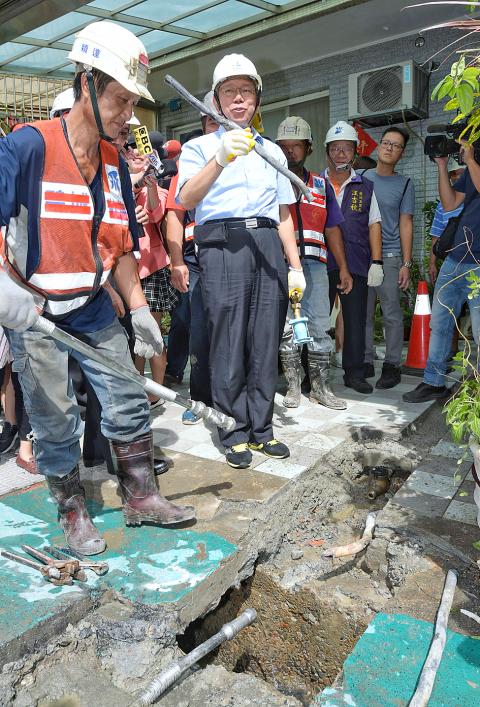The last section of Taipei’s lead water pipes was replaced yesterday, marking the completion of the replacement project about 15 months ahead of schedule, the Taipei Water Department said.
Following a tainted water scare in Hong Kong in 2015, when tap water was found to contain lead levels above WHO safety limits, a similar concern emerged in Taiwan after local media reported that lead pipes carried water to about 36,000 households in seven Taiwanese cities and counties.
The department at the time said that no lead pipes were installed after 1979 and that a total of 424km of lead pipes longer than 20m had been replaced between 2009 and 2013, adding that the remaining lead pipes in the city would be gradually replaced by 2025.

Photo: Chang Chia-ming, Taipei Times
However, Taipei Mayor Ko Wen-je (柯文哲) asked the department to reschedule the replacement project and allocate more funds to expedite it, promising to replace all lead pipes in the city with stainless steel pipes in three years.
Speaking at Dunqing Park (敦親公園) in Taipei’s Daan District (大安) yesterday, department Commissioner Chen Chin-hsiang (陳錦祥) said that with an additional budget of NT$420 million (US$13.86 million), the department was able to replace lead pipes serving 17,714 households in 21 months — 15 months sooner than scheduled.
At a media gathering in an alley next to the park, Ko held up the city’s last lead water pipe and gave a new stainless steel pipe to a worker to install it, marking the completion of the project.
“Taipei, being an old city, has a development history of more than a decade ... and the remaining ones [lead pipes] have been replaced in the past two years,” he said. “This marks the end of lead water pipes in Taipei.”
The new pipes are made using corrugated stainless steel tubing, which is also used in Japan, and has better resistance against earthquakes and mild excavator damage, Chen said, adding that the new pipes can ensure better water quality for the next 40 to 50 years.
Ko said the city government aims to install drinking fountains in all the parks in the city, hoping they will reduce the use of bottled water and disposable containers, which are a heavy burden on the environment.

AGING: As of last month, people aged 65 or older accounted for 20.06 percent of the total population and the number of couples who got married fell by 18,685 from 2024 Taiwan has surpassed South Korea as the country least willing to have children, with an annual crude birthrate of 4.62 per 1,000 people, Ministry of the Interior data showed yesterday. The nation was previously ranked the second-lowest country in terms of total fertility rate, or the average number of children a woman has in her lifetime. However, South Korea’s fertility rate began to recover from 2023, with total fertility rate rising from 0.72 and estimated to reach 0.82 to 0.85 by last year, and the crude birthrate projected at 6.7 per 1,000 people. Japan’s crude birthrate was projected to fall below six,

US President Donald Trump in an interview with the New York Times published on Thursday said that “it’s up to” Chinese President Xi Jinping (習近平) what China does on Taiwan, but that he would be “very unhappy” with a change in the “status quo.” “He [Xi] considers it to be a part of China, and that’s up to him what he’s going to be doing, but I’ve expressed to him that I would be very unhappy if he did that, and I don’t think he’ll do that. I hope he doesn’t do that,” Trump said. Trump made the comments in the context

SELF-DEFENSE: Tokyo has accelerated its spending goal and its defense minister said the nation needs to discuss whether it should develop nuclear-powered submarines China is ramping up objections to what it sees as Japan’s desire to acquire nuclear weapons, despite Tokyo’s longstanding renunciation of such arms, deepening another fissure in the two neighbors’ increasingly tense ties. In what appears to be a concerted effort, China’s foreign and defense ministries issued statements on Thursday condemning alleged remilitarism efforts by Tokyo. The remarks came as two of the country’s top think tanks jointly issued a 29-page report framing actions by “right-wing forces” in Japan as posing a “serious threat” to world peace. While that report did not define “right-wing forces,” the Chinese Ministry of Foreign Affairs was

PREPAREDNESS: Given the difficulty of importing ammunition during wartime, the Ministry of National Defense said it would prioritize ‘coproduction’ partnerships A newly formed unit of the Marine Corps tasked with land-based security operations has recently replaced its aging, domestically produced rifles with more advanced, US-made M4A1 rifles, a source said yesterday. The unnamed source familiar with the matter said the First Security Battalion of the Marine Corps’ Air Defense and Base Guard Group has replaced its older T65K2 rifles, which have been in service since the late 1980s, with the newly received M4A1s. The source did not say exactly when the upgrade took place or how many M4A1s were issued to the battalion. The confirmation came after Chinese-language media reported